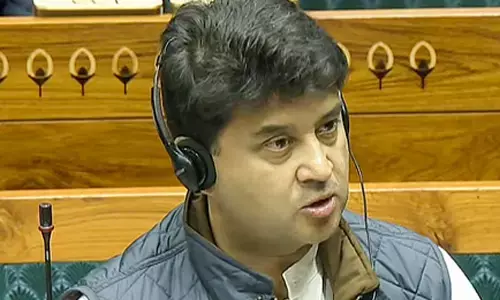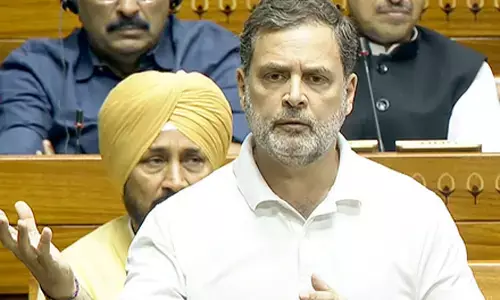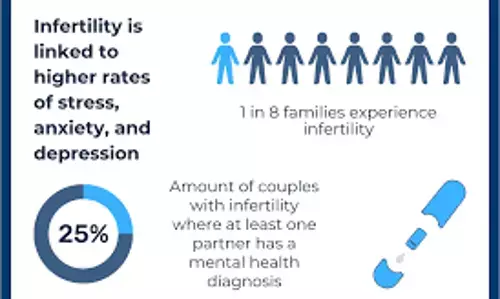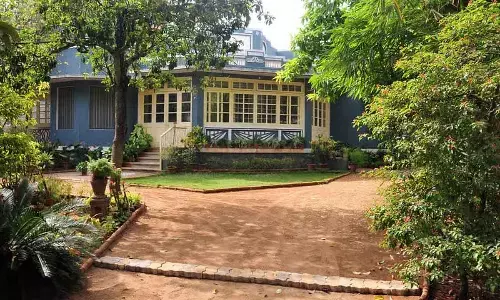Govt nod for SSC reforms

Govt nod for SSC reforms. The State government finally gave its approval on Wednesday, for the reforms that are initiated in SSC examinations and curriculum by the SCERT (State Council of Educational Research and Training).
Changes in Class IX too from 2014-15
80 per cent marks for public exams and 20 per cent internal marks
SAs and FAs to be objective, district-level teams to be formed
.jpg)
Hyderabad: The State government finally gave its approval on Wednesday, for the reforms that are initiated in SSC examinations and curriculum by the SCERT (State Council of Educational Research and Training). Principal Secretary of School Education, Poonam Malakondaiah in her order stated that the examination reforms include Class IX as well and they would be implemented from the next academic year i.e. 2014-15.
The revised text books have already been circulated to students well in advance.
The Director, SCERT has submitted proposals for the revised evaluation process and scheme of examination for classes IX and X and stated that “The proposed examination reforms will facilitate for a shift in the teaching learning process and improved transaction of new textbooks and transforms the ways of learning with activities, projects, dialogue and discussions, experiments etc.” It is in a way bidding goodbye to rote learning and encourage student to think, analyse critically and draw conclusions on their own.
The examination reforms will have to be implemented in all the secondary schools in the State i.e. government, government aided, panchayatraj bodies, recognised private schools, the government order made it clear.
The number of papers in annual examinations was reduced to nine and they will be conducted for 80 marks only. The remaining 20 marks will be for internals i.e. Formative Assessments (FA). There will be single paper for each language subjects-Telugu, English, Hindi, Urdu etc and two papers for non language subjects i.e. science, social studies and mathematics.
Science paper 1 will be on biological science and paper 2 on physical science whereas social studies paper 1 on geography and economics and paper 2 on history and civics; mathematics– paper 1 on numbers, sets, algebra, progressions, coordinate geometry and paper 2 on geometry, trigonometry, mensuration, statistics, probability etc.
“The duration of exam for language subjects (100 marks) will be three hours in addition to 15 minutes for reading the question paper. For non language subjects– mathematics, science and social studies – Every subject will have two papers and each paper is for 50 marks and the examination duration is two hours and 30 minutes in addition to 15 minutes for reading the question paper,” the order said.
The summative examinations which are school based for Class IX and the final summative is of public exams at Class X conducted by Director, Govt Examinations. The average of four formative assessments conducted in an academic year will be accounted for 20 per cent of marks i.e. the average of four formative assessments will be taken and accounted for 20 per cent of marks in Class X public examinations.
Three summative tests will be conducted in each academic year for classes IX and X. In case of Class X, public examination will be in place of third summative test to be conducted by the Board of Secondary Education.
The first and second Summative Assessments (SA) are to be conducted by schools itself
Hereafter, the children will not be allowed to rely on guides and study materials but they should think and write on their own.
For Formative Assessment, five marks each will be given on all subjects. For project works and slip test five marks each will be awarded. A separate notebook for each subject for the formative is to be maintained by each student. These notebooks reflecting children works must be preserved which will be the basis for awarding marks by the teacher and for the verification of officials whenever required.
10 to 15 schools in two or three mandals will be considered as a unit for monitoring and moderating. The moderation committee formulated by the DEO, will observe all the schools assigned in the given mandals both government and private and verify the marks, grades awarded for internals and as well as co-curricular activities.
“35 per cent is the pass marks for all the language and non language subjects. Students must qualify both in internals (FA) and summative examinations separately,” the order stated.
Eight grades are devised on the basis of marks obtained by the student and A1 is the highest- which is 91 marks to 100 marks. Cumulative Grade Point Average (CGPA) will be calculated by taking the arithmetic average of grade points.
“There will be other co-curricular activities such as physical and health education, arts and cultural education, work and computer education; value education and life skills. Periods have been allocated in the school timetable for transaction of these areas. These areas are now included for assessment in classes IX and X. Each area has 50 marks. Grade details of these subjects are to be recorded in the memorandum of marks of class IX and X. The five-point grade scale is applied to these areas i.e. A+, A, B, C and D. But no public exam will be conducted in these subjects. However, these areas will be evaluated for three times in an academic year i.e. quarterly, half yearly and annually,” the order explained.
SCERT will develop teacher handbooks on entire process of examination reforms and new textbooks and train the District Level Resource Persons in every subject area for the teachers teaching classes IX and X including supervisory staff in collaboration with RMSA.
One Headmaster with sound academic background and commitment must be made as in-charge of DCEB subject-wise district teams with 10 to 15 expert teachers will be formed to prepare the question papers.








